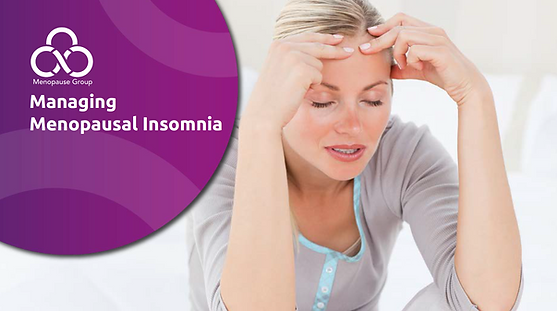MANAGING
MENOPAUSE INSOMNIA
The importance of sleep has become a topical subject in the world of health and wellbeing, with many studies and books being written. Once referred to as the third pillar of health and wellbeing after nutrition and exercise, it’s recently been referred to as the foundation of health – obtain a good sleep routine and everything else is easier to achieve.
Suffering from insomnia has an impact on our daily lives, sometimes the impact can be invisible, as irritability, lack of concentration, poor food choices can lead back to poor sleep, coping with insomnia during the menopause may feel overwhelming.

Sleeping Matters
As a woman approaches menopause the levels of oestrogen sharply decrease. Melatonin serum levels also decrease, but in a more gradual course. Chronic exposure to poor sleep quality is associated with depression, anxiety, and other conditions. There are also bidirectional associations —meaning that experiencing anxiety and depression very often affects sleep, which then impacts our ability to cope with the anxiety and depression, and so on.
Tracking Sleep
The pineal hormone melatonin plays an important role in the regulation of the circadian sleep/wake cycle, mood, and perhaps immune functions, carcinogensis and reproduction. The human circadian rhythm of melatonin release from the pineal gland is tightly synchronized with the habitual hours of sleep. Peri- and postmenopausal women often complain of difficulties initiating and/or maintaining sleep, with frequent nocturnal and early morning awakenings.
By keeping a record of sleep, the diary makes it possible to calculate total sleep time. A sleep record also helps people identify sleep disruptions and other factors that can influence sleep quality.

Managing Menopause Insomnia
In this guide we share nutritional information relating to melatonin and other vitamins relating to aiding good quality sleep, as well as practical advice. We’ve created two different styles of sleep journals, so you can choose the amount of detail you track both available in digital or print options.
Content includes:
-
Recommended minerals and vitamins to support quality sleep
-
Best practice sleep routines
-
Digital sleep journal / tracker
-
Printable sleep journal / tracker

Menopause Stages
3
Postmenopause
The term postmenopause is used for the years following menopause, and is a time when women are more at risk to health problems such as osteoporosis..
Connect with us.
If there is a particular topic you would like specific information on whether nutrition, exercise, meditation or alternative methods to support the menopause email info@menopausegroup.com and we will consult with our team.





